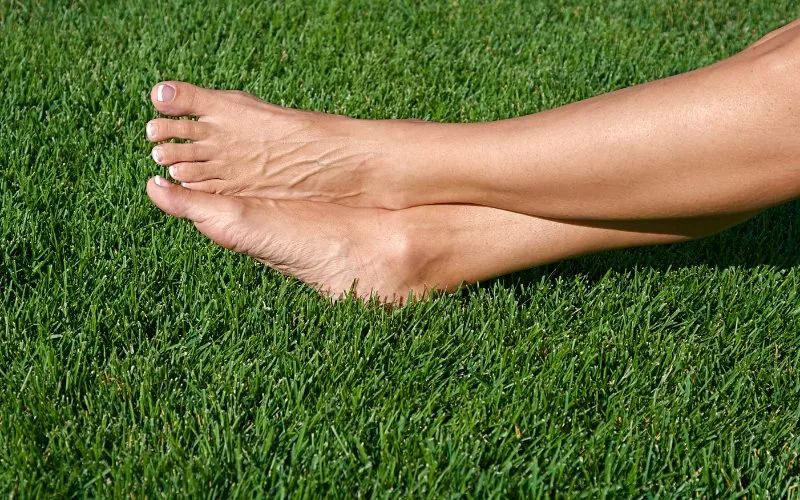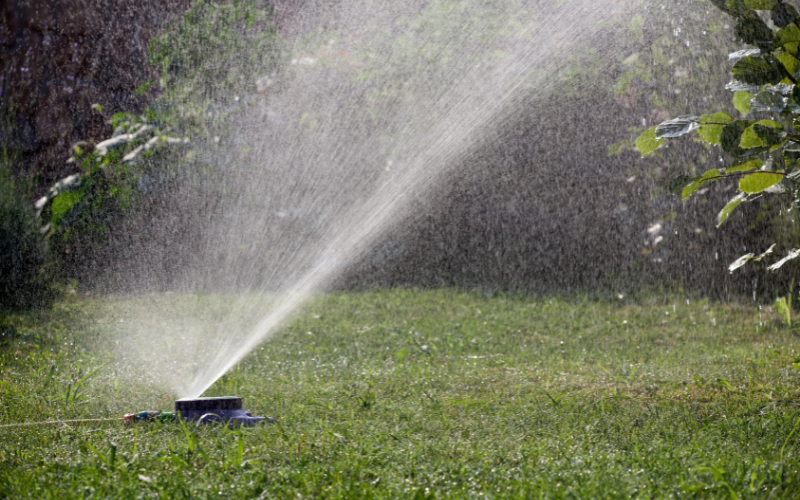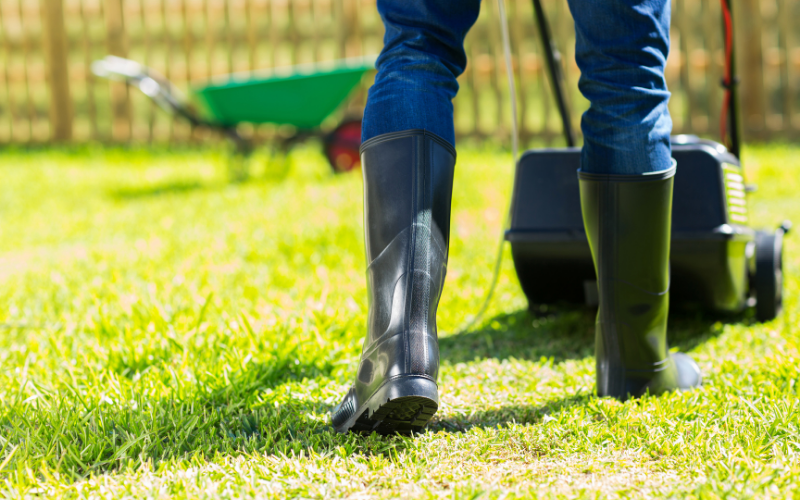Most people want a lush, green lawn that the family can enjoy. Not every grass meets that criterion. Lawn grass differs in softness. The thinner the blade of grass, the softer it feels. If you are looking for help finding the right soft lawn grass, you are in the correct place.

What Is The Softest Grass?
Many landscaping experts and homeowners think hybrid emerald zoysia grass (Zoysia japonica XZ. Tenuifolia) is the softest grass to walk on. It is a dense grass with a narrow blade that feels wonderful on bare feet. It is a warm-season grass, so goes dormant and brown all winter. Here’s what it looks like:

And here are some of the main pros and cons that are associated with this lawn grass.
| Pros | Cons |
|---|---|
| Greens up early in the spring | Brown all winter |
| Drought tolerant | Does not tolerate cold |
| Heat tolerant | Less dense in heavy shade |
| Tolerates shade | Must be mowed frequently |
| Tolerates heavy traffic | Requires frequent fertilization |
| Water wise | |
| Competitive against weeds | |
| Softest grass type |
Other Soft Lawn Grasses to Consider
Because Zoysia grass does not do well everywhere, here are some other grasses to consider.
Light Green Hybrid Bermuda
Light green hybrid Bermuda (Cynodon dactylon x trasvaalensis) is very soft. Make sure you get this hybrid because many types of Bermuda grass are tough and unpleasant to walk on. This is a warm-season grass.
| Pros | Cons |
|---|---|
| Tolerates heat | Needs a lot of water |
| Tolerates high traffic | Brown in winter |
| Drought tolerant | Does not tolerate shade |
| Salt tolerant | |
| Competitive against weeds |
Creeping Bentgrass
Creeping bentgrass (Agrostis stolonifera) is often used on Northern golf courses. It is a soft, dense cool-season grass.
| Pros | Cons |
|---|---|
| Adapted to cool, humid regions | Does not tolerate heat |
| Tolerates low temperatures | High water use |
| Withstands high foot traffic | High maintenance in the south |
| Forms dense, blue-green mats | |
| Low maintenance in the north | |
| Tolerates partial shade |
Creeping Red Fescue, Chewings Fescue & Hard Fescue
Creeping red fescue (Festuca rubra L. ssp.), Chewings fescue (Festuca rubra ssp. commutata Gaudin), Sheep fescue (Festuca ovina L.), and Hard fescue (Festuca brevipila Tracey) all have very fine blades and are very soft. They are usually mixed together into a seed mix and grown in the north.
| Pros | Cons |
|---|---|
| The most shade tolerant turf grass | Burns up in the sun |
| Cold Tolerant | Does not like frequent mowing |
| Low maintenance | Poor heat tolerance |
| Low fertilizer needs | Poor heat tolerance |
| Clumping grasses |
Kentucky Bluegrass
Kentucky bluegrass (Poa pratensis L.) isn’t really blue, but it is soft. It grows well in the north. It prefers a pH between 6-7.
| Pros | Cons |
|---|---|
| Grows well in cool, moist weather | Does not tolerate heat |
| Dense enough to outcompete weeds. | Needs dethatching frequently |
| High water use | |
| May need lime treatment | |
| Poor in shade |

Making Your Grass Softer
No matter what type of lawn grass you have, there are ways to make it softer. In general, the softest lawn grasses are dense. Here are some things you can do to get dense stands of grass in your lawn.
Get a Soil Test

The best time to get a soil sample is just before spring green-up. You can get a soil sample bag and instructions from your County Extension Agent. Be sure to write down the type of grass you have. The results of your soil test will give you fertilizer recommendations for that type of grass, based on what is in your soil. If you follow these recommendations, you will give the lawn the fertilizer it needs without wasting money on fertilizer that doesn’t meet the lawn’s needs.
Apply Pre-Emergent to Your Established Lawn
Pre-emergent keeps weed seeds from growing in your lawn. Apply it in the early spring, before things start growing. Without the weeds to 1) hurt when you step on them and 2) grab water, nutrients, and oxygen from your lawn, the lawn will be denser and healthier. Do not put down pre-emergent where you will be planting seeds as it will kill them, too.
Dethatch Your Lawn When It Needs It
Your grass needs water, nutrients, and oxygen. When you have a layer of thatch that is ¼-½ inch, the water, nutrients, and oxygen cannot penetrate it. That means the roots are not getting what they need. Really bad thatch can even kill the roots and thus, the lawn.
Deeply Water Your Lawn

Different types of turf need different amounts of water. All of them benefit from weekly deep watering instead of daily watering. When a lawn is watered once a week, the roots grow deep into the ground so they can suck up all that water. When a lawn is watered daily, the roots do not grow very deep, and the plant is more vulnerable to drought and heat. One way to tell how much water you are putting on your lawn is to use empty tuna fish cans or cat food cans. Place them in different places on the lawn and turn on the sprinkler. Time how long it takes the cans to get an inch of water in them. You can figure out how long to run your sprinkler system based on this time.
Mow Properly

Different turf grasses have different ideal mowing lengths. A cardinal rule of thumb is to cut no more than 1/3 of the leaf blade at any one time. This may mean you have to mow more often if the grass is growing a lot. Make sure that your mower blades are sharp (Read this if you’re not sure how sharp your mower blade should be). Sharp blades cut cleanly so the cut seals off quickly. Dull blades leave ragged cuts and even tears. This opens the grass blade to fungus, bacteria, and diseases while the cut heals.
Final Thoughts on Soft Lawn Grass
While not everyone can grow zoysia grass, there is a soft lawn grass for everyone. If you are not sure which grass to grow in your area, reach out to the Extension Agent for your county. It is their job to answer your questions on turf grass. With a little help, you can be walking barefoot in the soft grass in your yard.


What is the best and softest grass to grow in high altitude in Virginia City, Nv.
I’m thinking Ky blue grass
Hi Mark!
Thanks for your comment. Given the location and considering both altitude and average temperatures, a warm-season grass would likely be best. Kentucky Bluegrass may struggle to thrive here. I would recommend looking into a cultivar of Blue Grama. It may not be a grass you have heard much about, but it’s a native grass type with several cultivars that improve on what you would find growing naturally. It has a very fine, soft texture and appearance as well. As a close second or if you are unable to find a cultivar you like, it may be worth considering Buffalograss, one of the softest turfgrasses.
Hope this helps 🙂
Chris.